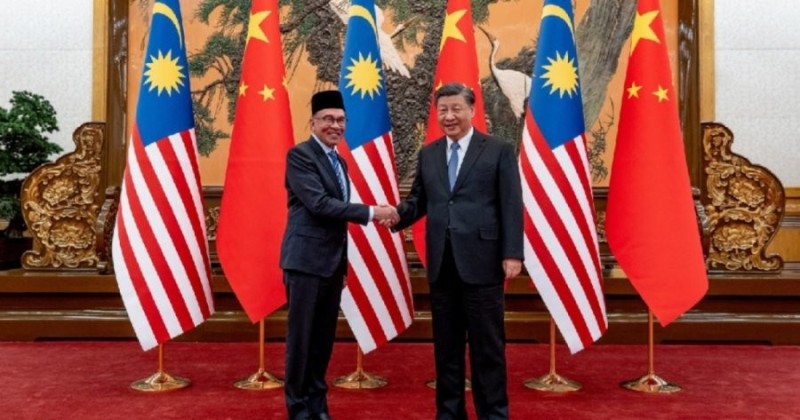
The Small and Medium Enterprises Association of Malaysia (SAMENTA), the nation’s oldest and largest association representing SMEs, has welcomed the state visit of President Xi Jinping to Malaysia from 14 to 16 April 2025 as a landmark opportunity to elevate Malaysia–China bilateral ties, particularly in the realm of SME trade and cooperation.
Datuk William Ng, President of SAMENTA, said that the visit symbolises a new chapter in the enduring friendship and strategic partnership between both nations, noting that the timing could not be more opportune for Malaysian SMEs, as the reaffirmation of the Belt and Road Initiative (BRI), digital cooperation, and commitments to sustainable development present a valuable platform for enhanced trade and investment
“China remains Malaysia’s largest trading partner, and with renewed bilateral focus on innovation and sustainability, there is tremendous scope for SMEs in both countries to explore mutually beneficial collaborations,” Ng said in a statement.
Opportunities for SMEs in the Evolving Malaysia-China Relationship
Ng highlighted that Malaysian SMEs are well-positioned to leverage Chinese digital trade platforms to expand exports of halal-certified foods, health supplements, and artisanal products to China’s large and increasingly discerning consumer market.
He also identified opportunities for partnerships in the areas of renewable energy, waste management, and energy-efficient manufacturing, which can create global joint ventures extending beyond China and Malaysia.
With the resumption of group travel and strengthened cultural exchange, SMEs in tourism, food and beverage, and the creative sectors will also be well-placed to benefit from this bilateral engagement.
China’s growing interest in ASEAN as a strategic production base could also enable Malaysian SMEs to embed themselves into high-value supply chains while championing the “Made by Malaysia” brand — highlighting Malaysian intellectual property, branding, and innovation.
Levelling the Playing Field for SMEs
While optimistic about the prospects, Datuk William Ng cautioned against overlooking structural challenges. He acknowledged that China, with its vast regulatory ecosystem and market complexity, remains an intimidating landscape for many Malaysian SMEs. Issues related to intellectual property (IP) protection continue to be a major concern for Malaysian businesses seeking to enter or expand in the Chinese market.
“Our SMEs lack the scale, financing, and institutional support that many Chinese firms enjoy. We urge that any future collaborations take this disparity into account to ensure a fair and balanced partnership. Trade must not be lopsided,” he said.
Policy Recommendations: Enabling True SME Collaboration
To unlock the full potential of SME-driven bilateral cooperation, Ng called on both governments to expedite mutual recognition of standards and certifications — especially in food, cosmetic, and medical products — to lower non-tariff barriers and streamline cross-border trade.
He also urged that Malaysia and China ensure that inclusive trade frameworks, such as the Regional Comprehensive Economic Partnership (RCEP), as well as any future bilateral agreements, include dedicated SME chapters with enforceable provisions. These provisions should address disparities in capability and ensure a level playing field for smaller enterprises, especially those in emerging sectors.
“As the younger sibling in this relationship, we hope China will extend meaningful assistance to help our SMEs build capacity and compete on fair terms,” said Ng.
Putting SMEs at the Heart of Economic Diplomacy
While acknowledging the significance of the 31 high-level memoranda of understanding (MoUs) signed during the visit, Ng expressed concern that such agreements have traditionally focused on large corporations and government-linked companies.
“The real economic multiplier lies within our SME sector. We urge both governments to go beyond headline agreements and implement downstream programmes that facilitate SME involvement — particularly in high-impact sectors such as artificial intelligence, green energy, and satellite applications,” he stressed.
Ng also pointed out that past initiatives like the digital free trade zone, which were aimed at leveraging Malaysia as a regional base for Chinese firms, had yielded limited benefits for Malaysian SMEs. He urged for greater transparency and inclusiveness in future China-backed infrastructure and digital economy initiatives in Malaysia to ensure that local SMEs are not sidelined.
A Call for Cross-Border Digital Enablement
In conclusion, Ng called on Chinese stakeholders to play a more proactive role in helping Malaysian SMEs integrate into Chinese digital platforms.
“If China is serious about supporting Malaysian SMEs, then there must be structured initiatives to onboard our SMEs onto cross-border platforms, especially those operated by Chinese technology firms. This will help our businesses tap into the vast opportunities offered by the Chinese market,” he said.
SAMENTA reiterated its full support for deeper Malaysia–China engagement and reaffirmed its commitment to work closely with both governments to ensure that SMEs remain at the heart of this evolving partnership.
Source: https://sme.asia/strengthening-sme-collaboration-amidst-renewed-malaysia-china-relations/

